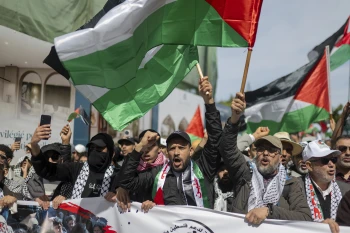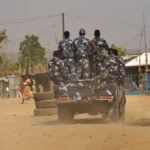In recent weeks, Morocco has emerged as a focal point for solidarity movements in the Arab world, particularly in response to Israel’s military offensive in Gaza. Citizens have taken to the streets, driven by a profound sense of outrage towards the violence and devastation inflicted upon the Palestinian people. Demonstrations across major cities like Casablanca, Rabat, and Marrakech have highlighted not only the country’s historical support for Palestine but also a rising discontent towards American foreign policies, notably those espoused by former President Donald Trump.
For years, Morocco has maintained a delicate balancing act in its foreign relations—nurturing ties with Israel while simultaneously advocating for Palestinian rights. However, the current escalation of hostilities, which has led to significant civilian casualties and destruction in Gaza, has galvanized public sentiment. On October 21, 2023, thousands of Moroccans gathered to march in solidarity with Gaza, chanting slogans supporting Palestine and condemning the violence. Their messages were unequivocal: they demand an end to the bloodshed and advocate for the rights of Palestinians to live in peace.
The protests highlight a blend of local and international grievances. Many Moroccans view the U.S. as complicit in Israel’s actions, particularly after Trump’s administration facilitated the normalization of relations between Israel and several Arab countries, including Morocco, through the Abraham Accords in 2020. Critics argue that this diplomatic pivot has emboldened Israel, allowing it to act aggressively without facing substantial repercussions from its allies. During a protest in Rabat, demonstrators carried placards that read, “Trump’s legacy: blood on the hands!” underscoring a collective resentment towards U.S. policies perceived as antagonistic to Palestinian self-determination.
While Morocco’s King Mohammed VI has long advocated for Palestinian rights and serves as the head of the Al-Quds Committee of the Organization of Islamic Cooperation (OIC), the youth-led protests convey a growing impatience with the pace and effectiveness of diplomatic efforts. In a series of grassroots movements, young activists utilizing social media platforms have mobilized and shaped public discourse around the crisis, increasingly identifying with the global wave of pro-Palestinian sentiment that has surged following recent events.
The Morocco protests mirror wider trends across the Arab world, from Tunisia to Jordan, and contribute to a reinvigorated sense of pan-Arab solidarity. These movements are not only a reaction to the situation in Gaza; they encapsulate a broader discontent with the status quo, particularly regarding U.S. involvement in the region’s geopolitics. Many demonstrators called for a reevaluation of Morocco’s diplomatic strategy, advocating for a stronger stance on the Palestinian issue rather than one diluted by foreign interests.
As crowds rallied in placards and chants, there was also a striking desire for justice, with some signs calling for the end of military aid to Israel and the recognition of Palestinian statehood. This echoes sentiments expressed in other countries, where public opinions increasingly lean towards unequivocal support for Palestinian rights, further reflecting the sea change in regional dynamics ignited by the ongoing crisis.
In conclusion, Morocco’s protests against Israel’s offensive in Gaza represent a significant moment in the intersection of local activism and global solidarity. Citizens, particularly the youth, are not only voicing their condemnation of violence but are also sharpening their critique of U.S. foreign policy as a critical component of the Palestinian plight. While the road ahead remains fraught with challenges, the outcry in Morocco exemplifies a burgeoning commitment to advocating for justice in a region that has felt the weight of conflict for far too long.
Email Us on editorial@nnafrica.com













